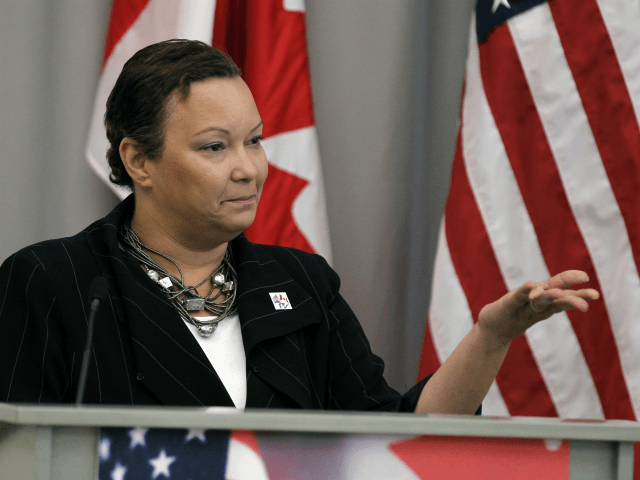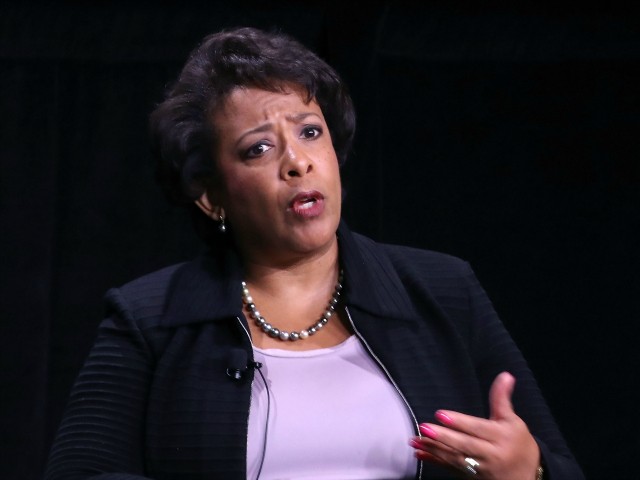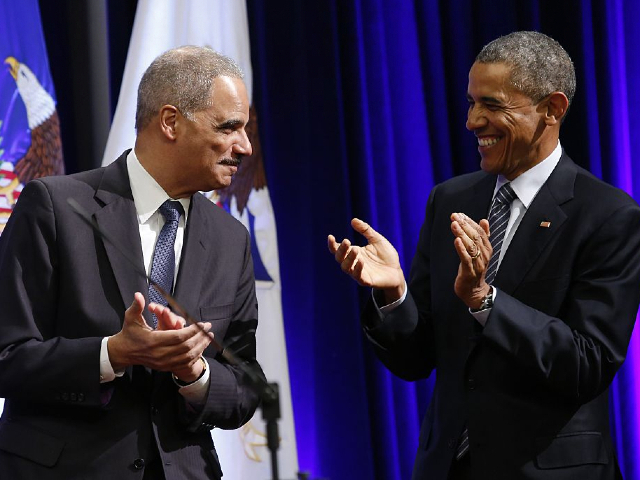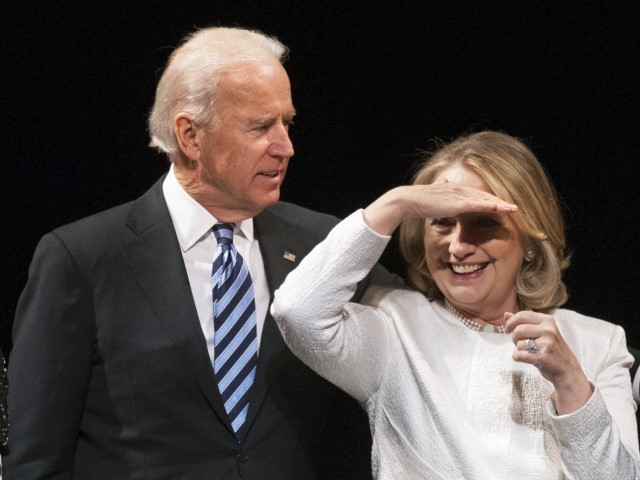Six Obama administration officials used alias email addresses, including then-Vice President Joe Biden and former President Barack Obama.
Whether connected to a government network or not, it is unusual for government officials to use an email alias. Not only is it peculiar, it raises questions about why Obama administration officials utilized aliases and whether government secrets were compromised.
Below is a list of six U.S officials who used an email alias within the Obama administration:
1) Lisa Jackson, 2013

EPA Administrator Lisa Jackson Friday, Sept. 7, 2012, at the Canadian Embassy in Washington. (AP Photo/Alex Brandon)
Jackson used the “Richard Windsor” alias as the former EPA Administrator, according to the Washington Post:
Jackson, who left the agency earlier this year, used an e-mail account associated with the pseudonym Richard Windsor to take online training programs on subjects including ethics, whistleblowers and records preservation, said the Competitive Enterprise Institute, which has been critical of the agency. CEI said Monday that it had obtained EPA records that covered certifications in 2010, 2011, and 2012 through a Freedom of Information Act request.
Republicans have pounced on Jackson’s use of the fake identity for her non-public e-mail account, saying that it might be part of an effort to skirt transparency and public records requirements. (As to the origin of the alias, Richard was the name of Jackson’s dog, and Windsor refers to East Windsor, N.J., Jackson’s former hometown).
2) Loretta Lynch, 2016

U.S. Attorney General Loretta Lynch, speaks during a Criminal Justice Summit September 13, 2016, in Washington, DC. (Photo by Mark Wilson/Getty Images)
Lynch used the email alias “Elizabeth Carlisle” as Obama’s attorney general, the Federalist reported:
Lynch was caught conducting a secret meeting with Bill Clinton aboard a private plane on a tarmac in Phoenix last year as Clinton’s wife pursued the presidency and amid an ongoing investigation into Hillary Clinton’s private, unsecured email server, which she illegally used during her tenure as secretary of State. Soon afterward, the former attorney general reportedly used a pseudonym to coordinate a narrative about the meeting with Department of Justice officials, Chuck Ross at The Daily Caller reports.
Also shortly after the private plane meeting, former FBI director James Comey announced that agency would not pursue a case against Clinton, despite admitting he had enough evidence to do so. A month later, Lynch announced the DOJ would not investigate the Clinton Foundation’s relationship with the State Department during Hillary’s tenure, despite the FBI’s recommendation to do so. The chain of events caused many to question Lynch’s motives, as it was also widely reported that Hillary planned to keep Lynch as attorney general had Clinton won the election.
3) Eric Holder, 2015
Holder used three separate alias email addresses after he took office in 2009 as the attorney general, the Los Angeles Times reported:
Holder’s previous aliases were Henry Yearwood and David Kendricks, Fallon confirmed. His current alias has not been released.
The alias “Henry Yearwood” is a combination of his mother’s maiden name and the first name of another family member, the Huffington Post reported. “David Kendricks” is a mashing of Temptations members David Ruffin and Eddie Kendricks, according to the Post.

President Barack Obama applauds outgoing Attorney General Eric Holder at the portrait unveiling ceremony at the Justice Department in Washington, DC, on February 27, 2015. (Photo credit should read YURI GRIPAS/AFP via Getty Images)
4) Barack Obama, 2016
Obama used an alias email address to communicate with his secretary of state, two-time failed presidential candidate Hillary Clinton. None-for-profit Marco Polo unearthed his alias as “Obama725.” Politico reported:
The State Department has refused to make public that and other emails Clinton exchanged with Obama. Lawyers have cited the “presidential communications privilege,” a variation of executive privilege, in order to withhold the messages under the Freedom of Information Act.
The report doesn’t provide more details on the contents of that particular email exchange, but says it took place on June 28, 2012, and had the subject line: “Re: Congratulations.” It may refer to the Supreme Court’s ruling that day upholding a key portion of the Obamacare law.
It’s been known since last year that Obama and Clinton corresponded occasionally via her private account, but the White House has insisted Obama did not know she relied on it routinely and exclusively for official business.
5) Joe Biden, 2016
Joe Biden used aliases “Robert Peters,” “Robin Ware,” and “JRB Ware” for personal and professional use. In 2016, “Robert Peters” received an email about a scheduled call with the Ukrainian president Petro Poroshenko, the Ukrainian official who fired the prosecutor investigating Burisma Holdings. The energy company was paying Hunter Biden $83,000 a month to sit on the board.
The House Oversight Committee argues that Joe Biden threatened to withhold U.S. aid to Ukraine in 2015 until the president of Ukraine fired prosecutor Viktor Shokin, who had jurisdiction for an investigation into the Ukrainian energy company Burisma Holdings.
Hunter Biden’s laptop contained 27 emails linked to Joe Biden’s pseudonym email address, Marco Polo’s dossier cataloged.

Vice President Joe Biden and former Secretary of State Hillary Rodham Clinton appear onstage at the Vital Voices Global Partnership 2013 Global Leadership Awards gala at the Kennedy Center for the Performing Arts in Washington, Tuesday, April 2, 2013. (Cliff Owen/AP)
6) Hilary Clinton, 2016
Hillary Clinton used two alias email addresses “hdr22” and “hrod17,” uncovered by the infamous email scandal, Breitbart News reported:
Hillary Clinton set up a private email server, and a private email network for herself and her family and Abedin. Doing so could prevent her emails from being “accessible” to the federal government, not to mention Congress.
The private network allowed Clinton, Abedin, and aides Cheryl Mills and Jake Sullivan to swap emails with the Clinton Foundation, various world leaders, and Doug Band’s global consulting firm Teneo Holdings, where Abedin also worked during her time at the State Department. This would have been problematic, considering Clinton’s 2009 ethics agreement, leaked on Cryptome, in which she vowed not to coordinate with the Clinton Foundation.
The FBI investigation began with one simple premise: that Hillary Clinton violated the Espionage Act of 1913 by allowing national defense information to be “lost, stolen, abstracted, or destroyed” through “gross negligence.” Clinton team emails have now ended up in the hands of Julian Assange — a man who lives sequestered in an Ecuadorian embassy — and in the hands of detectives in the Anthony Weiner sexting case.
Follow Wendell Husebø on Twitter @WendellHusebø. He is the author of Politics of Slave Morality.


